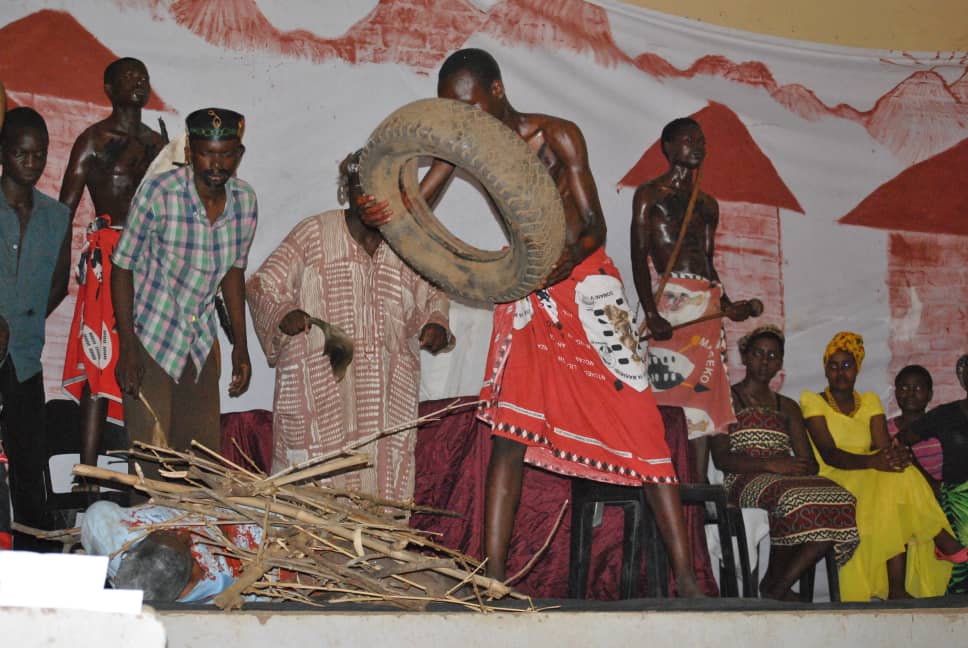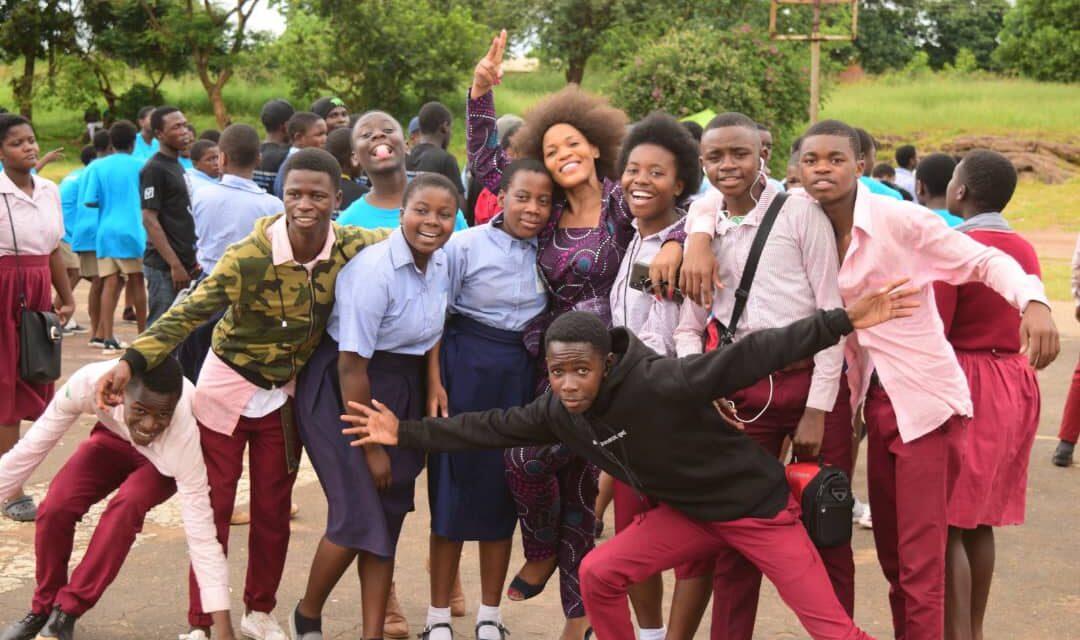It’s an ordinary Saturday morning. The October sun is already hitting hard, I am sweating. I am in Lilongwe the capital city of Malawi, specifically at the Lilongwe Community Centre hall; an over five decades-old building that could use some renovations or even a complete overhaul. Vendors are passing by, selling their merchandise to whoever is willing to buy. Then the vehicles start to arrive. Vehicles carrying uniformed students. Vehicles carrying dismantled stage sets, costumes, and props. Soon the students disembark and start setting up in the hall. I am here to sit on the judging panel. Over six to seven hours of non-stop performances by students from secondary schools across the central region. The same is happening in all the four education regions of Malawi. It is the National Schools Youth Festival (Nasfest). Three winning schools from each region will perform at the Grand Festival to be held in February next year.
To organize such a feast of theatre requires great coordination as James Kitchen founder of NASFEST explains, “First of all we have to inform all the stakeholders and the whole team about the festival. The setting of the team is what makes it successful every year. Then we start budgeting. After budgeting it’s when we start submitting proposals to various stakeholders asking for their support. From there we start informing the involved schools and artists, we create the calendar of events for the festival and we post it on various social media platforms and notify the Ministry of Youth Sports and Culture. We also write the Ministry of Education about the same. From there we also inform the schools about the calendar.”
Kitchen and his team then go ahead to look for service providers like owners of venues, owners of sound systems, caterers, accommodation and everything to do with logistics and the welfare of the artists and participants. They must also make sure they find credible judges in all the three regions, find out how many schools are participating from each region, monitor and make follow-ups of the kind of productions the schools are preparing.
While James Kitchen is battling with questions like who to approach for funding and other things, his national coordinator, Fumbani Innot Phiri is going through the regions designing and conducting theatre workshops.
“Design has to go with a proper research on topics to tackle for us to come up with a theme for that year. Prep-Nasfest is a key tool where we try to reach out to twenty schools per in a space of two months. And communication is very vital.” Phiri says.
The result of all their hard work is coordinated performances in all four regions where schools battle it out to find the three top ones who represent their regions at the main festival.
Florence Magombo, now in college, participated in NASFEST in her secondary school days. She was then a student at Chiradzulu secondary school. She remembers their school’s performance at the 2014 Nasfest regional finals where they battled against ten other schools.
“The competition was tough. We competed against schools that had mature productions. At the end of the day, we were on position two and we went to represent our region at the national festival in Lilongwe, together with two other schools from our region.” Magombo says. It was her first time ever to visit Lilongwe and the trip added to the novelty of it all. “At the finals, we did not make it in the top three, we were on position four, we were sad, but still it was great and fun to watch other schools perform as well.” She adds. The experience with NASFEST landed Magombo a job with a professional theatre group, Solomonic Peacocks, and now she works with Young Development Collaborators (YDC) a theatre ensemble in which Phiri is the founder.
Another initiate of the NASFEST program is Tissie Chinombo who experienced NASFEST when she was at Zingwangwa Secondary school. She praises the festival saying that it really brings a great impact by helping young adults discover their talent and also providing a gateway from academic indulgencies hence helping them to relax their minds and develop the nation by conveying different messages to the people through art.

A participating school staging a mob justice scene. Photo courtesy of the NASFEST Communications team.
At the main festival, the groups from secondary schools share the stage with professional theatre groups. “Sometimes we invite professional artists, and we look at things like, are they youth? Are they role models? So that they can inspire the young performers.” Says Kitchen. It is probably this arrangement that connects the secondary school performers to the professional theatre-makers who will hire them once they are out of secondary school.
For the organizers of the festival, it has not been an easy ten years. A lot of challenges and lessons have been encountered along the way.
“Of course, we always have challenges. Sometimes stakeholders promise to support with certain amounts but then they don’t come forward with the support or they may support quarter or half of the total they pledged.” Kitchen says.
Other challenges as outlined by Magombo include difficulties finding accommodation since the city is filled with performers from all around the country.
How do they cope with those challenges? “When you have passion, you don’t focus on funding, you may just be distracted by financial challenges. The thing to do is to work on a low budget and hope for the best.” Kitchen says. It is probably this resilience that will ensure that Malawian secondary school students continue getting a platform to raise their theatrical voice in the years to come.
Despite following a social enterprise model where the audience buys tickets to watch the show, the festival still relies heavily on donor funding due to reasons of low prices to attract huge audiences, the alternative to which is high prices and low attendance. But that hasn’t stopped Kitchen and his team from making the festival happen. The result of their hard work and determination is ten years of giving young voices a platform in the theatre industry.
“We are happy that every year since we started in 2009 every year, we have managed to have young ones bring their production. Statistically, we have worked with over ninety-two schools with over 24,580 participating students and audiences. Fifteen professional theatre groups have also benefited from NASFEST.” Kitchen adds. He goes on to list some students who were part of the early days of NASFEST and have now gone ahead to establish their own theatre groups. Examples of which are Dzuwa Arts (Founded by Ignitious Kaphinde), Young Travelers (founded by Imran Shaban) and YDC-which Fumban Innot Phiri is the founder.
What happens after the festival is also an important element of NASFEST. Kitchen goes on to explain the follow-ups they make and other training platforms that are made available to the participants. It is this factor that makes Nasfest not a once a year event but rather a whole year event that has found itself an important component of the school calendar.
Going back to today’s competition, three schools have made it to the national finals. Best performers in various categories have been recognized and awarded for their efforts. Some schools return to their campuses happy, others sad, but at least they have had the Nasfest experience. It is a rewarding experience for all the stakeholders, including us judges who can afford to smile at the thought that the theatre baton stick is being passed on to the next generation.
This post was written by the author in their personal capacity.The opinions expressed in this article are the author’s own and do not reflect the view of The Theatre Times, their staff or collaborators.
This post was written by Isaac Mafuel.
The views expressed here belong to the author and do not necessarily reflect our views and opinions.


















